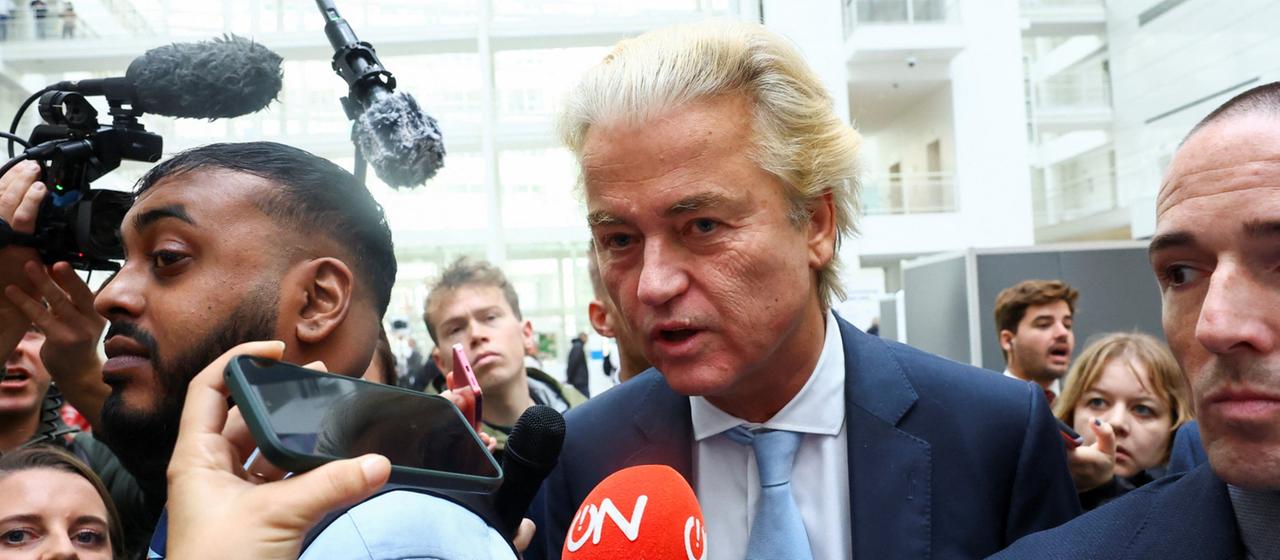
In the Dutch parliamentary elections, the party of right-wing populist Geert Wilders is no longer projected to be the strongest force. However, according to media reports, the result is so close that it could still change.
According to projections, the Party for Freedom (PVV) of right-wing populist Geert Wilders did not emerge as the strongest party in the Dutch parliamentary elections. The first forecast instead predicts the left-liberal Democrats 66 as the winner, as reported by Dutch television after the polls closed.
However, both parties are very close, so the result could still change. The left-liberal Democrats 66 (D66), led by Rob Jetten, can expect to win 27 of the 150 seats in the Hague parliament. Wilders is projected to win 25 seats.
Rob Jetten, the leading candidate of the left-liberal party D66, spoke of a"victory over hate." "This is a farewell to political negativity," the 38-year-old politician said at his party's election night party. The Dutch people had sent a clear signal for a positive future.
Larger parties have ruled out a coalition with Wilders
In the last election two years ago, the Islamophobe and EU opponent became the largest party for the first time, winning 37 seats. Unlike then, this time all major parties ruled out a coalition with him in the run-up to the election.
According to the forecast, the current right-liberal governing party, VVD, can expect 23 seats in parliament. The left-wing coalition GroenLinks/PvdA is projected to win 20 seats. The Christian Democrats follow with 19. The forecast by Dutch television is based on exit polls. Initial projections based on election results are not expected until later tonight.
Wilders:"The voter has spoken"
Wilders admitted that his result fell short of expectations."The voters have spoken," he wrote on X that evening."We had hoped for a different outcome." However, he added that his party was still the second strongest force and could still become the largest if the result changed later in the evening.
Frans Timmermans, the leading candidate of the red-green alliance GroenLinks-PvdA, has announced his resignation following the first projections."I am taking my leave as your party leader tonight," he told supporters in Rotterdam."I have not succeeded in convincing enough people to give us their vote."
That's why he wants to hand over the party leadership to a younger person, the 64-year-old politician said. Timmermans came to The Hague from Brussels two years ago hoping to become prime minister. In Brussels, he was vice-president of the European Commission.
The coalition collapsed after one year.
The election in the Netherlands became necessary after the premature collapse of the previous government in June of this year. This four-party government was considered the most right-wing in Dutch history. The strongest of the four coalition partners was the Party for Freedom (PVV) of Wilders. However, Wilders himself did not become Prime Minister. That position was held by the non-partisan former senior civil servant Dick Schoof.
After less than a year, Wilders and his party withdrew from the government. His reasoning was that the other three coalition partners did not support the implementation of a hardline anti-migration policy. This time, all major parties are refusing to cooperate with Wilders. Therefore, it seems unlikely that his party will be part of the government again.
Who will lead the new government instead is still uncertain. Generally, the top candidate of the strongest party has the best prospects. That would be Jetten from D66. He could become the youngest and first openly gay candidate to be the country's new prime minister. If the predictions are correct, then according to Jetten, this would be the best election result to date for D66, which was founded in 1966.

